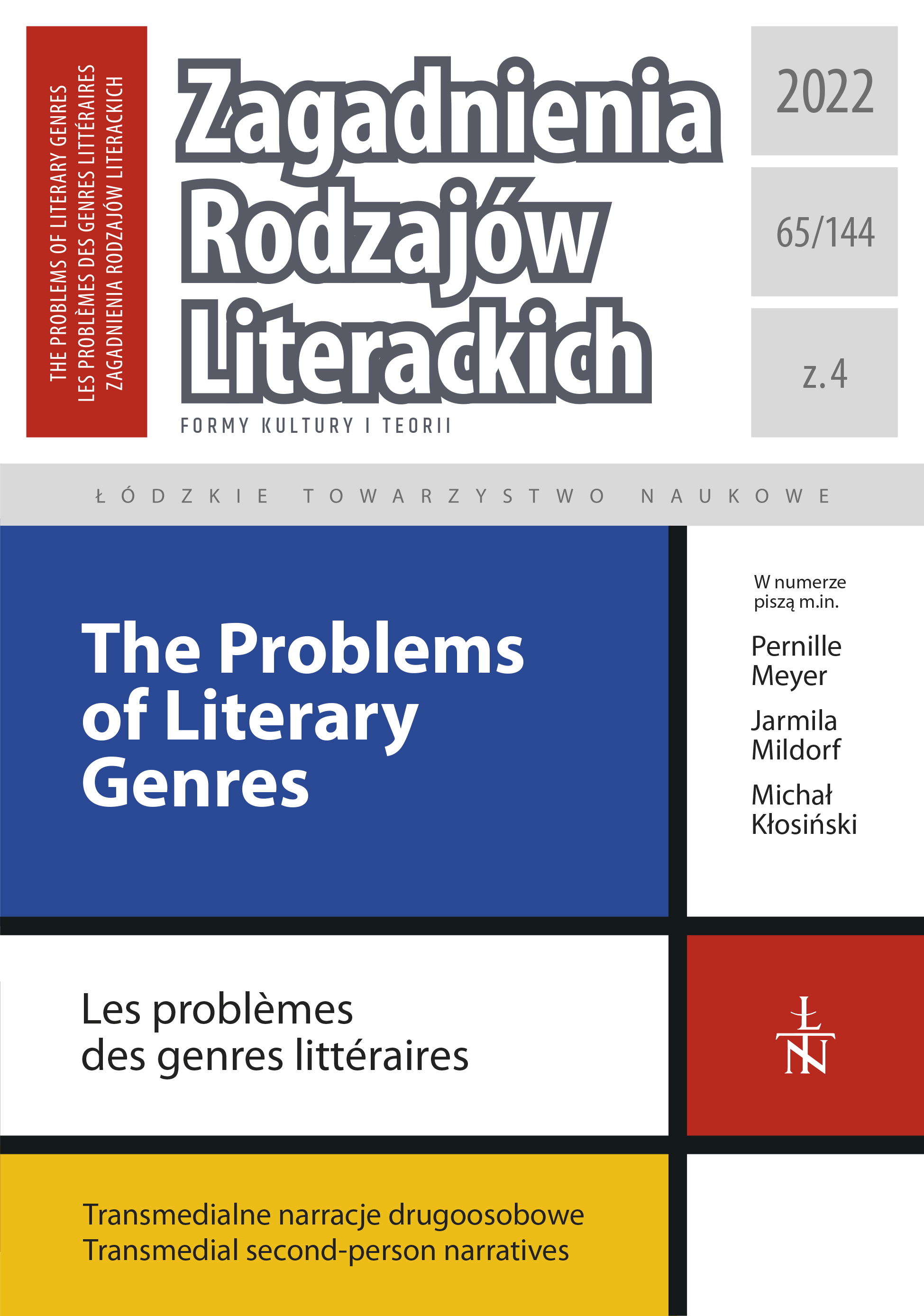Beyond Anthropocentrism: Functions of the Second-Person Zoonarration in the Novel Rat by Andrzej Zaniewski
DOI:
https://doi.org/10.26485/ZRL/2022/65.4/7Keywords:
animal narratives, second-person narration, intersubjectivity, Rat, Andrzej ZaniewskiAbstract
This paper presents a correlation between second-person narration and the more-than-human perspectivity in animal narratives. The analysis focuses on representations of “you” narration in Andrzej Zaniewski’s novel Rat, published for the first time in 1995. “Rat-centric” fiction, as Marco Caracciolo describes it, talks about various experiences of the title animal. Although the dominant diegetic form in the novel is the first-person narrative, the appearing parts of the text told from a second-person point of view turn out to be a significant element of a non-anthropocentric perspective. Considering the influence of form on the posthuman message, the paper is based on research in the field of animal studies and contemporary narratology, including, among others, Irene Kacandes’s “literary performative”, David Herman’s “double deixis” or Dominique Lestel’s “thinking with fur”. In this article, I propose to distinguish three functions of the second-person narrative in Rat: immersive, empathetic and identity roles. The immersive function participates in adapting a sensorimotor repertoire to the intersubjective perception of the non-human world. The second of them, the empathetic function, by bonding the human narratee with the animal character, opens a possibility of embodied co-experience and verification of anthropocentric norms. The third, identity function, participates in (de)constructing the rat selfhood. Findings of the proposed perspective of second-person zoonarration sheds new light on its formal opportunities for creating posthuman agency, thinking, and storytelling.
Downloads
References
Alber Jan, Iversen Stefan, Nielsen Henrik Skov, Richardson Brian (2010), Unnatural Narratives, Unnatural Narratology: Beyond Mimetic Models, „Narrative” nr 18(2).
Bal Mieke (2012), Narratologia. Wprowadzenie do teorii narracji, przeł. zespół tłumaczy ze specjalności przekładowej Instytutu Filologii Polskiej UAM w Poznaniu, Wydawnictwo Uniwersytetu Jagiellońskiego, Kraków.
Barcz Anna (2015), Wprowadzenie do zookrytyki (teorii zwierzęcych narracji), „Białostockie Studia Literaturoznawcze” nr 6.
Barcz Anna (2017), Animal narratives and culture. Vulnerable realism, Cambridge Scholars Publishing, Newcastle upon Tyne.
Bendor Daniel, Wilson Matthew A. (2012), Biasing the content of hippocampal replay during sleep, „Nature Neuroscience” nr 15.
Braidotti Rosi (2009), Podmioty nomadyczne. Ucieleśnienie i różnica seksualna w feminizmie współczesnym, przeł. A. Derra, Wydawnictwa Akademickie i Profesjonalne, Warszawa.
Burt Jonathan (2006), Szczur, przeł. A. Leśniak, TAiWPN Universitas, Kraków.
Caracciolo Marco (2016), Strange Narrators in Contemporary Fiction. Explorations in Readers’ Engagement with Characters, University of Nebraska Press, Lincoln, Londyn.
Campbell Joseph (2013), Bohater o tysiącu twarzy, przeł. A. Jankowski, Nomos, Kraków.
Damasio Antonio R. (2000), Tajemnica świadomości. Ciało i emocje współtworzą świadomość, przeł. M. Karpiński, Dom Wydawniczy Rebis, Poznań.
Fludernik Monika (1994), Introduction: Second Person Narrative and Related Issues, „Style” nr 28(3).
Fludernik Monika (1996), Towards a ‘Natural’ Narratology, Routledge, Londyn, Nowy Jork.
Foote Allison L., Crystal Jonathon D. (2007), Metacognition in the Rat, „Current Biology” nr 17(6).
Genette Gérard (1980), Narrative Discourse. An Essay in Method, przeł. J.E. Lewin, Cornell University Press, Ithaca, Nowy Jork.
Genette Gérard (1988), Narrative Discourse Revisited, przeł. J.E. Lewin, Cornell University Press, Ithaca, New York.
Haraway Donna (2012), Manifest gatunków stowarzyszonych, przeł. J. Bednarek [w:] Teorie wywrotowe. Antologia przekładów, red. A. Gajewska, Wydawnictwo Poznańskie, Poznań.
Herman David (2002), Story Logic. Problems and Possibilities of Narrative, University of Nebraska Press, Lincoln.
Herman David (2016), Animal Autobiography; Or, Narration beyond the Human, „Humanities” nr 5(4).
Herman David (2018), Narratology beyond the Human. Storytelling and Animal Life, Oxford University Press, Nowy Jork.
Hopkins Mary Frances, Perkins Leon (1981), Second Person Point of View in Narrative [w:] Critical Survey of Short Fiction, red. F.N. Magill, Englewood Cliffs, Salem.
James Erin (2015), The Storyworld Accord. Econarratology and Postcolonial Narratives, University of Nebraska Press, Lincoln, Londyn.
Jarzyna Anita (2019), Post-koiné. Studia o nieantropocentrycznych językach (poetyckich), Wydawnictwo Uniwersytetu Łódzkiego, Łódź.
Kacandes Irene (1993), Are You In the Text? The ‘Literary Performative’ in Postmodernist Fiction, „Text and Performance Quarterly” nr 13(2).
Krupiński Piotr (2021), Co się śni zwierzętom? Eseje z pogranicza zoofilologii i psychoanalizy, Instytut Badań Literackich PAN, Warszawa.
Lestel Dominique (2015), Myśleć sierścią. Zwierzęcość w perspektywie drugoosobowej, przeł. A. Dwulit [w:] Zwierzęta i ich ludzie. Zmierzch antropocentrycznego paradygmatu, red. A. Barcz, D. Łagodzka, Instytut Badań Literackich PAN, Warszawa.
Łebkowska Anna (2008), Empatia. O literackich narracjach przełomu XX i XXI wieku, TAiWPN Universitas, Kraków.
Nelles William (2001), Beyond the Bird’s Eye: Animal Focalization, „Narrative” nr 9(2).
Osborn Jody, Derbyshire Stuart W.G. (2010), Pain Sensation Evoked by Observing Injury in Others, „Pain” nr 148(2).
Pisula Wojciech (2003), Psychologia zachowań eksploracyjnych zwierząt, Gdańskie Wydawnictwo Psychologiczne, Gdańsk.
Rembowska-Płuciennik Magdalena (2012), Poetyka intersubiektywności. Kognitywistyczna teoria narracji a proza XX wieku, Wydawnictwo Naukowe Uniwersytetu Mikołaja Kopernika, Toruń.
Richardson Brian (2006), Unnatural Voices. Extreme Narration in Modern and Contemporary Fiction, The Ohio State University Press, Columbus.
Ricoeur Paul (2005), O sobie samym jako innym, przeł. B. Chełstowski, Wydawnictwo Naukowe PWN, Warszawa.
Zaniewski Andrzej (1995), Szczur, Wydawnictwo Kopia, Warszawa.







